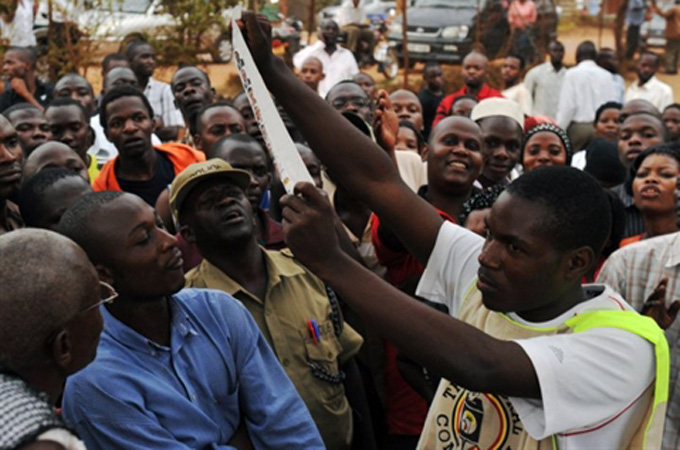Museveni wins disputed Uganda vote
Yoweri Museveni re-elected president for fourth term, but opposition rejects poll result.

 |
| Official opposition reject the election results alleging that the election was fixed [AFP] |
Yoweri Museveni, one of Africa’s longest serving leaders, has been re-elected the president of Uganda for a fourth term in a poll disputed by the opposition.
Electoral commission results on Sunday handed Museveni 68 per cent of the vote against his rival, Kizza Besigye’s 26 per cent.
“The electoral commission declares Yoweri Kaguta Museveni elected president of the republic of Uganda on the
presidential elections held on the 18th day of February, 2011,” Badru Kiggundu, chairman of the Electoral Commission of Uganda, said in a statement.
Result rejected
Besigye rejected the results alleging that huge sums had been used to buy votes and to bribe polling agents, candidates in the simultaneous parliamentary election, and electoral officials.
“An election conducted under such environment cannot reflect the will of the people and clearly the institutions
of the state charged with the management of the election have failed our country.
“And therefore we have taken the following decisions, one, categorically reject the out come of the elections and two, to reject the leadership of Yoweri Museveni and any person or persons he may purport to appoint as a result of this election,” Besigye told a news conference.
A witness told the Reuters news agency that there was a heightened security presence in the capital, Kampala. Soldiers and police patrolled on foot and in armoured personnel carriers, and riot police were ferried around in trucks and riot control vehicles.
Sporadic celebrations erupted in the city as scores of cars with speakers pumping out music and plastered with
signs reading “Thank you. Pakalast” drove around the streets. “Pakalast”, Museveni’s campaign slogan, means
“Until the end”.
European Union (EU) observers said that an unnecessary military presence on voting day had created an uneasy,
intimidatory ambience.
They say the vote was undermined in a number of areas.
“The electoral process was marred by avoidable and we underline the word avoidable, administrative and logistical
failures as an umbrella of many failures for various administrative and logistical ones which then led to an
unacceptable number of Ugandan citizens being disenfranchised,” Edward Scicluna, head of the EU observer
team, told reporters.
Votes ‘rigged’
Besigye said he would keep the country informed of his Inter-Party Cooperation coalition’s next steps.
He has repeatedly said that his supporters could take to the streets, and that Uganda is ripe for an Egypt-style
revolt.
Al Jazeera’s Mohammed Adow, reporting from Kampala, said Museveni has “given himself another five years at the helm of Uganda’s leadership”.
“That will take his rule of this country to thirty good years. His supporters are happy but not the opposition – who claim the votes were rigged,” he said.
“The opposition is saying there have been instances where their agents and officials across the country were intimidated by police and that ballot boxes were stuffed. However, the National Resistance Movement of president Museveni is saying that is not true and that the votes were free and fair.”
Many Ugandans complain their country is riddled with corruption and lacks investment in public services and
infrastructure.
Others respect Museveni for restoring stability and overseeing a period of sustained economic growth in a country previously plagued by dictators such as Idi Amin.